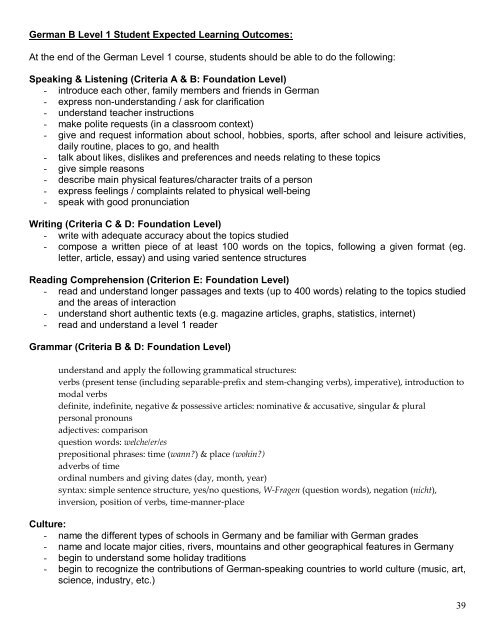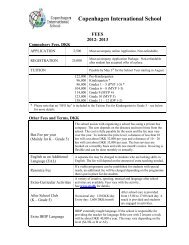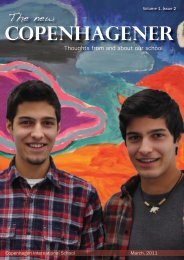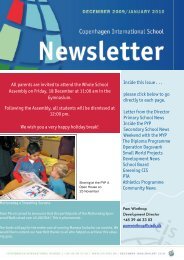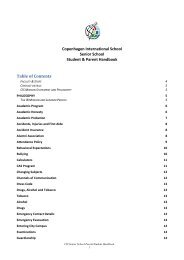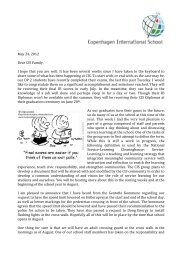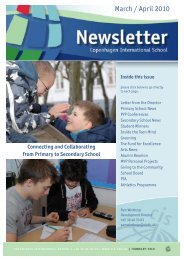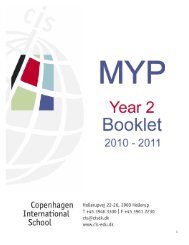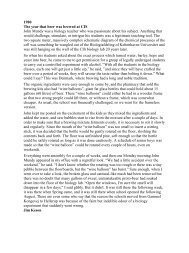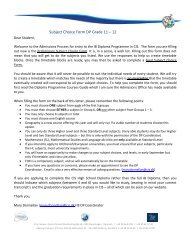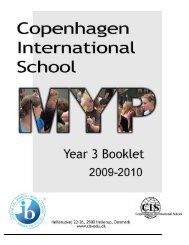German B - Copenhagen International School
German B - Copenhagen International School
German B - Copenhagen International School
You also want an ePaper? Increase the reach of your titles
YUMPU automatically turns print PDFs into web optimized ePapers that Google loves.
<strong>German</strong> B Level 1 Student Expected Learning Outcomes:<br />
At the end of the <strong>German</strong> Level 1 course, students should be able to do the following:<br />
Speaking & Listening (Criteria A & B: Foundation Level)<br />
introduce each other, family members and friends in <strong>German</strong><br />
express nonunderstanding / ask for clarification<br />
understand teacher instructions<br />
make polite requests (in a classroom context)<br />
give and request information about school, hobbies, sports, after school and leisure activities,<br />
daily routine, places to go, and health<br />
talk about likes, dislikes and preferences and needs relating to these topics<br />
give simple reasons<br />
describe main physical features/character traits of a person<br />
express feelings / complaints related to physical wellbeing<br />
speak with good pronunciation<br />
Writing (Criteria C & D: Foundation Level)<br />
write with adequate accuracy about the topics studied<br />
compose a written piece of at least 100 words on the topics, following a given format (eg.<br />
letter, article, essay) and using varied sentence structures<br />
Reading Comprehension (Criterion E: Foundation Level)<br />
read and understand longer passages and texts (up to 400 words) relating to the topics studied<br />
and the areas of interaction<br />
understand short authentic texts (e.g. magazine articles, graphs, statistics, internet)<br />
read and understand a level 1 reader<br />
Grammar (Criteria B & D: Foundation Level)<br />
understand and apply the following grammatical structures:<br />
verbs (present tense (including separable‐prefix and stem‐changing verbs), imperative), introduction to<br />
modal verbs<br />
definite, indefinite, negative & possessive articles: nominative & accusative, singular & plural<br />
personal pronouns<br />
adjectives: comparison<br />
question words: welche/er/es<br />
prepositional phrases: time (wann) & place (wohin)<br />
adverbs of time<br />
ordinal numbers and giving dates (day, month, year)<br />
syntax: simple sentence structure, yes/no questions, W‐Fragen (question words), negation (nicht),<br />
inversion, position of verbs, time‐manner‐place<br />
Culture:<br />
name the different types of schools in <strong>German</strong>y and be familiar with <strong>German</strong> grades<br />
name and locate major cities, rivers, mountains and other geographical features in <strong>German</strong>y<br />
begin to understand some holiday traditions<br />
begin to recognize the contributions of <strong>German</strong>speaking countries to world culture (music, art,<br />
science, industry, etc.)<br />
39


